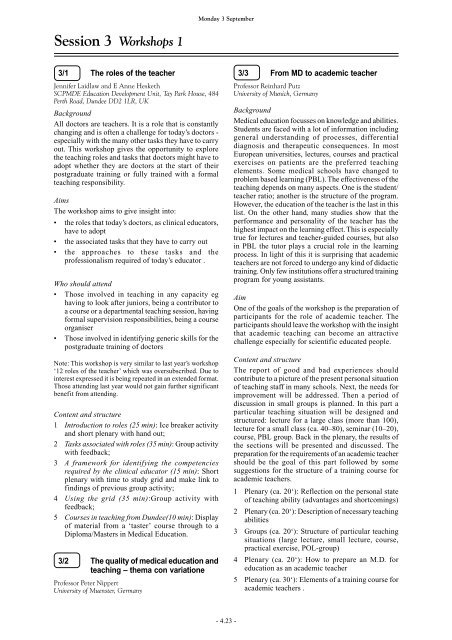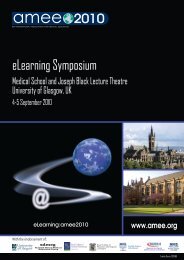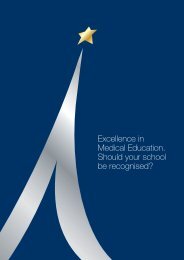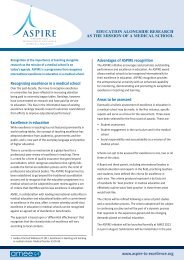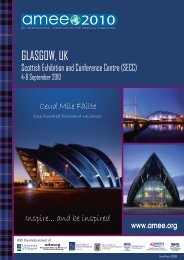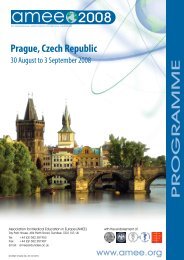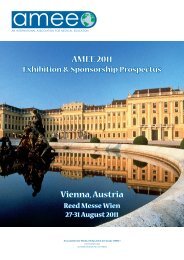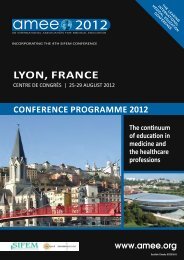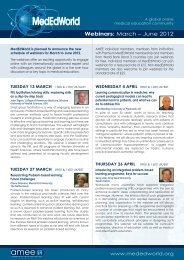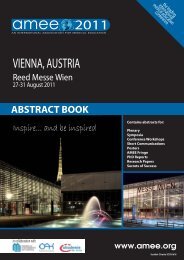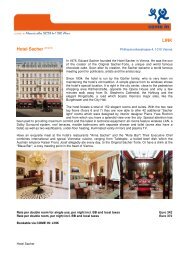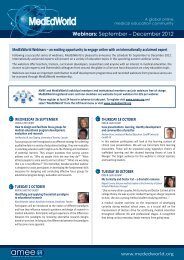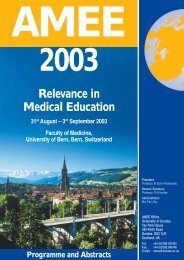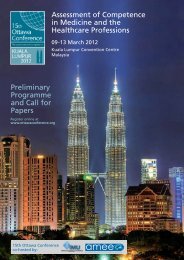AMEE Berlin 2002 Programme
AMEE Berlin 2002 Programme
AMEE Berlin 2002 Programme
Create successful ePaper yourself
Turn your PDF publications into a flip-book with our unique Google optimized e-Paper software.
Session 3 Workshops 1<br />
3/1 The roles of the teacher<br />
Jennifer Laidlaw and E Anne Hesketh<br />
SCPMDE Education Development Unit, Tay Park House, 484<br />
Perth Road, Dundee DD2 1LR, UK<br />
Background<br />
All doctors are teachers. It is a role that is constantly<br />
changing and is often a challenge for today’s doctors -<br />
especially with the many other tasks they have to carry<br />
out. This workshop gives the opportunity to explore<br />
the teaching roles and tasks that doctors might have to<br />
adopt whether they are doctors at the start of their<br />
postgraduate training or fully trained with a formal<br />
teaching responsibility.<br />
Aims<br />
The workshop aims to give insight into:<br />
the roles that today’s doctors, as clinical educators,<br />
have to adopt<br />
the associated tasks that they have to carry out<br />
the approaches to these tasks and the<br />
professionalism required of today’s educator .<br />
Who should attend<br />
Those involved in teaching in any capacity eg<br />
having to look after juniors, being a contributor to<br />
a course or a departmental teaching session, having<br />
formal supervision responsibilities, being a course<br />
organiser<br />
Those involved in identifying generic skills for the<br />
postgraduate training of doctors<br />
Note: This workshop is very similar to last year’s workshop<br />
‘12 roles of the teacher’ which was oversubscribed. Due to<br />
interest expressed it is being repeated in an extended format.<br />
Those attending last year would not gain further significant<br />
benefit from attending.<br />
Content and structure<br />
1 Introduction to roles (25 min): Ice breaker activity<br />
and short plenary with hand out;<br />
2 Tasks associated with roles (35 min): Group activity<br />
with feedback;<br />
3 A framework for identifying the competencies<br />
required by the clinical educator (15 min): Short<br />
plenary with time to study grid and make link to<br />
findings of previous group activity;<br />
4 Using the grid (35 min):Group activity with<br />
feedback;<br />
5 Courses in teaching from Dundee(10 min): Display<br />
of material from a ‘taster’ course through to a<br />
Diploma/Masters in Medical Education.<br />
3/2 The quality of medical education and<br />
teaching – thema con variatione<br />
Professor Peter Nippert<br />
University of Muenster, Germany<br />
Monday 3 September<br />
- 4.23 -<br />
3/3 From MD to academic teacher<br />
Professor Reinhard Putz<br />
University of Munich, Germany<br />
Background<br />
Medical education focusses on knowledge and abilities.<br />
Students are faced with a lot of information including<br />
general understanding of processes, differential<br />
diagnosis and therapeutic consequences. In most<br />
European universities, lectures, courses and practical<br />
exercises on patients are the preferred teaching<br />
elements. Some medical schools have changed to<br />
problem based learning (PBL). The effectiveness of the<br />
teaching depends on many aspects. One is the student/<br />
teacher ratio; another is the structure of the program.<br />
However, the education of the teacher is the last in this<br />
list. On the other hand, many studies show that the<br />
performance and personality of the teacher has the<br />
highest impact on the learning effect. This is especially<br />
true for lectures and teacher-guided courses, but also<br />
in PBL the tutor plays a crucial role in the learning<br />
process. In light of this it is surprising that academic<br />
teachers are not forced to undergo any kind of didactic<br />
training. Only few institutions offer a structured training<br />
program for young assistants.<br />
Aim<br />
One of the goals of the workshop is the preparation of<br />
participants for the role of academic teacher. The<br />
participants should leave the workshop with the insight<br />
that academic teaching can become an attractive<br />
challenge especially for scientific educated people.<br />
Content and structure<br />
The report of good and bad experiences should<br />
contribute to a picture of the present personal situation<br />
of teaching staff in many schools. Next, the needs for<br />
improvement will be addressed. Then a period of<br />
discussion in small groups is planned. In this part a<br />
particular teaching situation will be designed and<br />
structured: lecture for a large class (more than 100),<br />
lecture for a small class (ca. 40–80), seminar (10–20),<br />
course, PBL group. Back in the plenary, the results of<br />
the sections will be presented and discussed. The<br />
preparation for the requirements of an academic teacher<br />
should be the goal of this part followed by some<br />
suggestions for the structure of a training course for<br />
academic teachers.<br />
1 Plenary (ca. 20‘): Reflection on the personal state<br />
of teaching ability (advantages and shortcomings)<br />
2 Plenary (ca. 20‘): Description of necessary teaching<br />
abilities<br />
3 Groups (ca. 20‘): Structure of particular teaching<br />
situations (large lecture, small lecture, course,<br />
practical exercise, POL-group)<br />
4 Plenary (ca. 20‘): How to prepare an M.D. for<br />
education as an academic teacher<br />
5 Plenary (ca. 30‘): Elements of a training course for<br />
academic teachers .


